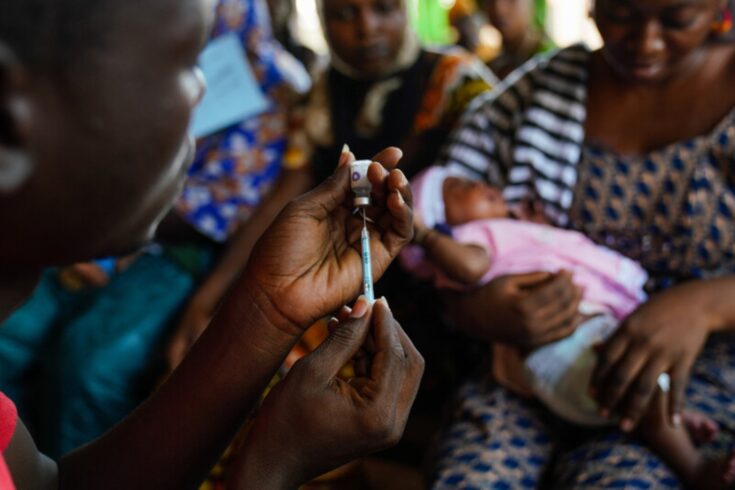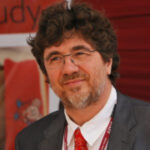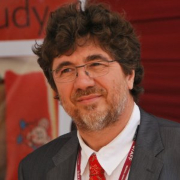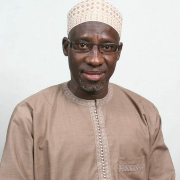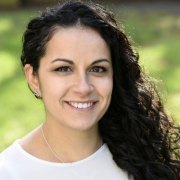Since 2014, Professor Umberto D’Alessandro has directed the Medical Research Council Unit The Gambia (MRCG) at the London School of Hygiene and Tropical Medicine (LSHTM). It stands as the UK’s largest single investment in medical research in a low and middle-income country. In November 2022, the unit celebrated their 75th anniversary with a three-day symposium, bringing together leaders in public and global health.
Professor D’Alessandro said:
It is a rich history, crossing several historical periods during which new ways of thinking emerged, and new tools for diagnosis, treatment and disease control were developed.
They were joined for the celebrations by the President of the Republic of The Gambia, His Excellency Mr Adama Barrow, alongside senior representatives of the Gambian government.
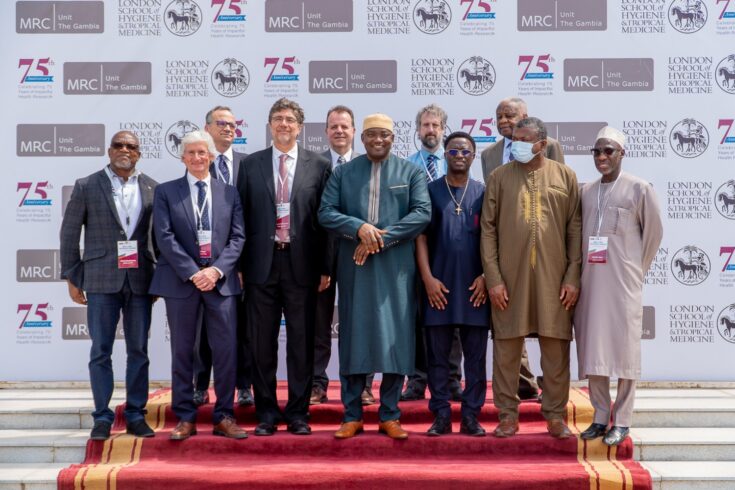
MRCG at LSHTM 75th anniversary dignitaries (left to right): Chief Operating Officer, MRCG at LSHTM, Dr Davis Nwakanma; Director, LSHTM, Professor Liam Smeeth; Director, MRCG at LSHTM, Professor Umberto D’Alessandro; Chief Scientific Officer, MRC, Robin Buckle; President, The Gambia, H.E Adama Barrow; Head of Infections and Immunity, MRC, Stephen Oakeshott; Minister of Higher Education Research Science and Technology, Professor Pierre Gomez; Minister of Health, Gambia, Dr Ahmadou Lamain Samateh; President and Co-founder, Africa Research Excellence Fund, Sir Professor Tumani Corrah; Head of Research Training and Career Development, Professor Assan Jaye. Credit: Louis Leeson, LSHTM
Global health research impact
The MRCG at LSHTM is a leader in health research in West Africa, working to save lives and improve health regionally and worldwide. It’s an international centre of excellence in research and training. Research programmes cover vaccines and immunity, women’s and child health, infectious diseases and nutrition in The Gambia and beyond.
The vibrant symposium celebrated many major research and public health achievements across their history, including:
- reductions in malaria incidences in The Gambia, driven by control and prevention studies. The development of insecticidal bed nets resulted in a 63% reduction in deaths in children under five, and a 25% reduction in deaths in children one to nine years
- successful clinical trials and vaccine developments which have reduced death and disease, including vaccines against hepatitis B, pneumonia, and meningitis
- the eradication of Haemophilus influenzae type B (Hib) disease in The Gambia, a main cause of pneumonia and meningitis in children in low-income countries
- the discovery of pathogens causing moderate- to-severe diarrhoea, via the largest study ever conducted on diarrhoeal diseases in low-income countries. This prompted the addition of the rotavirus vaccine to the national immunisation programme
- supporting the elimination of trachoma in The Gambia in 2021, the second country in the WHO Africa Region to achieve this
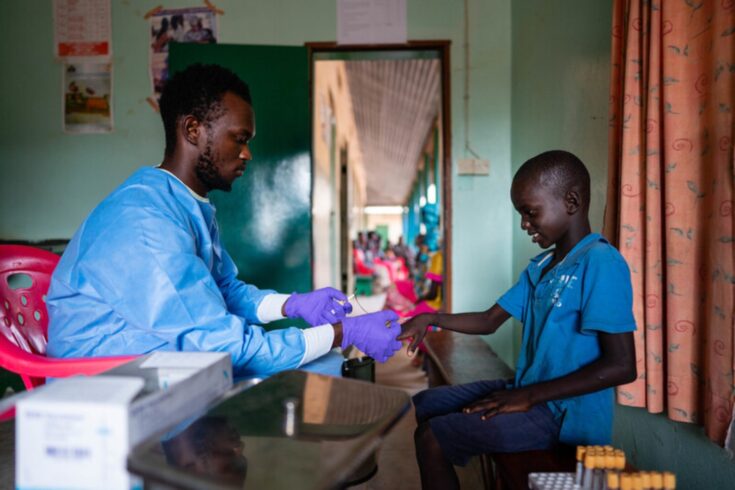
Clinician takes a blood sample from a young boy at Sibanor. Credit: Louis Leeson, LSHTM
Building the next generation of African scientists
The MRCG is equipping future generations of scientists and clinicians to provide quality healthcare and healthcare research in West Africa and beyond.
In his opening speech, Professor D’Alessandro noted:
Our investment in capacity building remains at the heart of what we do. We are committed to supporting the professional development of African scientists.
His Excellency Mr Adama Barrow remarked that:
Your Institution not only creates employment opportunities for our young University leavers, but many have professionally grown through the excellent postgraduate training support you offer to your staff, thus contributing immensely to our country’s skills and education-based economy.
These initiatives include PhD awards, which train an average of 28 African researchers annually, 60% of which are Gambian, and an internship program of whom 70% are Gambian school leavers.
Developing early career researchers
Professor Assan Jaye, Head of Research Training and Career Development, testifies:
MRCG contributes significantly to increasing Gambian and African capacity for health research. The undergraduate-supported training allowed the supply of 95% of talented technical support staff with a minimum qualification of BSc degree, as opposed to only 30% of the staff with degrees in the previous 15 years.
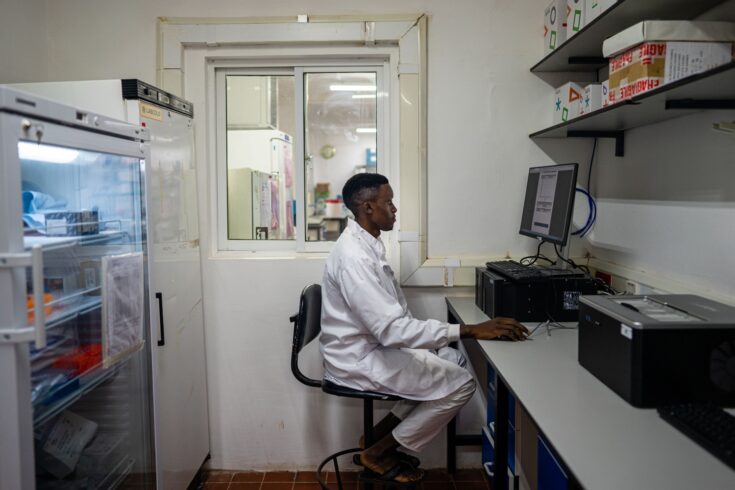
A technician runs tests in the laboratory in Fajara at MRCG at LSHTM. Credit: Louis Leeson, LSHTM
Many progress to their Masters, PhD or both, of which in 2021, 37% and 55% respectively were also females. As highlighted in the Journal of Global Health, mapping externally funded international postgraduate training across 11 African health institutions (2012 to 2017) showed the MRCG had hosted the highest number of grantees.
Professor Jaye remarks that:
The unit has a strong commitment to develop African senior research leaders through its development programme, and leadership and mentorship programs are providing skills for early career researchers to attract grants and build careers.
Embedded in the community
The MRCG has a longstanding partnership with the Gambian people, which enables high-quality healthcare, training and employment opportunities. Clinical services for Gambians in Fajara and Keneba remain the unit’s most visible side, and many benefit from their assistance at other public health institutions and clinics nationally. For instance, The Gambia reached the Millennium Development Goal (four) of decreasing childhood mortality years before the deadline in 2015, evidenced through the MRCG’s health and demographic surveillance systems.
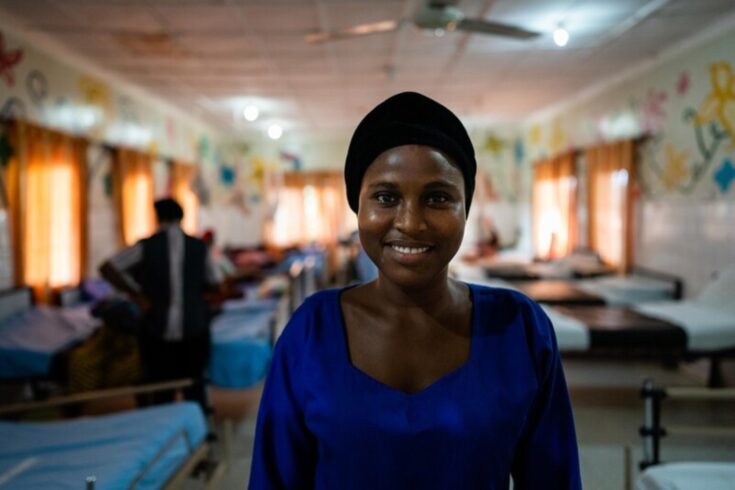
Isatou, a ward nurse in Fajara at the MRCG at LSHTM. Credit: Louis Leeson, LSHTM
The unit has always worked closely with the Gambian government through their Ministry of Health, helping to deliver effective public health responses, strengthening epidemic preparedness and building more resilient healthcare systems. This includes the public health interventions and training provided by the MRCG during COVID-19.
These co-benefits are exemplified by the delivery of vaccine trials, which have resulted in The Gambia having one of the best Expanded Program on Immunisation (EPI) schedules in Africa. Many vaccines trialled in The Gambia are now part of national vaccination campaigns, such as Hib and Hepatitis B vaccines, pneumococcal conjugate vaccine and a meningitis A vaccine.
Practical solutions for public health challenges
So what’s planned for the future? According to Professor D’Alessandro:
We are breaking new ground in genomics and in health and climate change. Discovery science, actionable research and innovative thinking at the MRCG will help drive practical and needed solutions to some of humanity’s most challenging issues for human health in West Africa and beyond.
I believe we can contribute substantially to build up the next generation of African scientists, to be internationally competitive and at the forefront of research in diseases of public health importance in Africa.
Find out more
The MRCG has a state-of-the-art Genomics and Data Centre which offers courses on bioinformatics of infectious diseases, and supports skill development through the MRCG West African Research Programme.
The unit also offers LSHTM short courses. Normally held in London, they offer Africans the opportunity to attend without the challenges of travelling to the UK. This includes ‘Introduction to Epidemiology and Medical Statistics’, and starting in November 2023 will include clinical trials and health systems.

